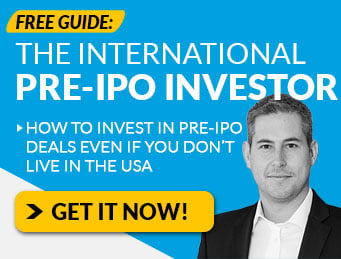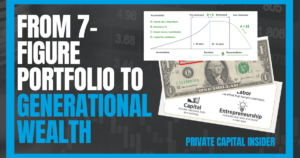Whenever we’ve asked our subscribers what the number one thing is they want to avoid…
It’s almost always some version of “I don’t lose money.”
And even though I think we all understand that private market deals are speculative, illiquid, and risky by nature…
I think we can all agree that we’re okay with companies failing… but the last thing we want is to get suckered into the next “Enron” and lose our money that way.
The secret to avoiding them?
It all has to do with this one thing every professional investor DOES have that amateur investors DO NOT.
It’s called an Investment Policy Statement.
And it’s similar to a business plan (but for investing).
Now, full disclosure, I can’t pretend I can help you 100% avoid investments that lose money or outright “scams”…
But if you’re looking for a fast, easy, simple way to help you make better investment decisions, an Investment Policy Statement is a great start (and when coupled with this sneaky shortcut it can be very powerful)…
Here’s why…
The difference between an amateur investor (“dumb money”) and a professional investor (“smart money)”
They don’t have an Investment Policy Statement that helps them identify the following four things…
- Primary Motivation: What is their “reason why” for investing?
- Investment Style: What types of investments (or trades) do they like to make?
- Investment Process: How do they answer the question “is this a good investment?”
- Risk Profile: How much risk are they willing to take?
When you look at the typical amateur investor, there’s one major thing we know to be true…
Aside from “I want to make more money” or “I’m afraid of running out of money,” most people have no real idea why they’re investing in the first place.
Regardless of how much money they do – or don’t – have, they are very emotional when they invest. Most of their decisions are based on instinct or “gut feel”…
And for the most part, this means their Primary Motivation is based around short term gains and speculation (i.e. gambling).
They’re influenced by the promises of big returns in a short period of time, persuaded by fear-based claims, and tricked by artificial scarcity.
They’re constantly jumping from hot trend to new fad… and can only think in time horizons of days, weeks, and months.
As a result, their Investment Style is entirely reactive.
New investment opportunities show up in what can essentially be called a “random” basis; In effect, they are evaluating each investment decision on a 1:1 basis…
In practice, amateur investors ask questions like “Should I invest in [XYZ]?”
Which, by itself, is an impossible question to give a simple “yes/no” answer to.
Why? Because in order to answer that question, there needs to be some sort of Investment Process…
A document that clearly defines what types of investments you will – and perhaps more importantly, won’t – consider…
As well as a process for scoring each investment opportunity to determine if it matches what you’re looking for.
And the reason why amateur investors are considered “dumb money?”
- They don’t use any process at all (or they don’t consistently use one).
- They’re overly reliant on “hot tips” or “advice” from largely unqualified sources…
- And they don’t do any of their own due diligence on the recommendations they’ve been given.
When we look at the overall Risk Profile “dumb money” is taking, it’s almost always a LOT more risk than the “smart money” does.
Because risk doesn’t come from the investment itself…
It comes from the investor not knowing what they’re doing.
And the problem is only made worse when the investor is chasing after hot fads and shiny objects instead of narrowing their focus.
Now, to reiterate a point we’ve already made, only you can decide what the right opportunities are for you.
And the best way to do that is by going here and using our free Investment Policy Statement generator.
It takes less than five minutes to complete… but once you have this simple document by your side, it will save you hours of time you’d otherwise waste analyzing opportunities that simply aren’t a good fit for you.
Sincerely,
Jake Hoffberg – Publisher
Equifund



